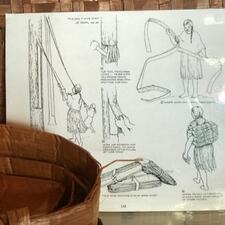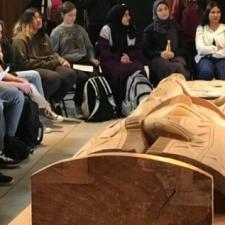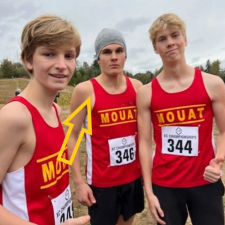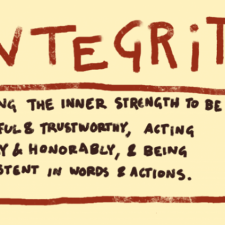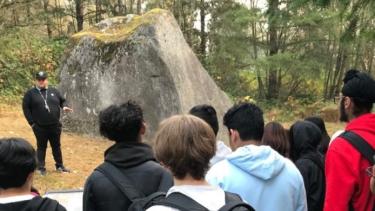
News From The Nest Oct 31 to Nov 4 2022
Spotlight on Learning – Learning in a Good Way
On Tuesday, October 18th, Ms. Esau with the assistance of Mr. Drummond took two Social Studies 10 classes to the Xa:ytem National Historic Site of Canada. The heritage value of Xa:ytem resides largely in the spiritual importance of the Transformer Stone and its association with the preservation of Stó:lō history, culture and spirituality. Xa:ytem is a testament to Stó:lō spirituality and to the survival and resilience of the Stó:lō nation.
The closely associated habitation site is one of the oldest discovered (ca. 5000 years). It is valued for its connection with Stó:lō history and culture and for the scientific information it reveals. This field trip was offered by Stó:lō knowledge keepers in the areas of longhouse life, pithouse living, carving and the story of the Transformer Stone.
The students had the opportunity to listen and see how the Stó:lō people fished, hunted and lived in harmony with nature and the changing seasons. They were able to touch the tools, stones, carvings, and materials used for thousands of years. They were also reminded that in the teaching of Stó:lō culture, the connectedness of Mother Earth, and of the history and creation of the Stó:lō people; and it is a source of spiritual awareness and renewal.
In our reflection response after the field trip, students wrote “I learned that the Stó:lō people used everything from nature and to not take advantage of it, or waste anything.” Another student shared, “I learned that the Stó:lō people adjusted their lifestyles and living spaces a lot according to the weather and the environment.” And “Another thing I learned about Stó:lō culture was their way of communicating with greetings, celebrations etc. through song and music.” One of the final takeaways was when one of the students shared how “the field trip was actually a lot more interesting than I thought it would be and I think that it would actually be cool to live in a pithouse.”
Overall, the students had a great experience learning about historical perspective, cultural and historical significance and the impact that colonization had on Stó:lō culture.
Part Two of our Mini-Series on Race, Racism, and Anti-Racism: The N-Word, Its History, and Why we can’t use it if we aren’t Black
According to Neal A Lester, dean of humanities and former chair of the English department at Arizona State University, “the n-word is unique in the English Language. On one hand, it is the ultimate insult – a word that has tormented generations of African Americans. Yet over time, it has become a popular term of endearment by the descendants of the very people who once had to endure it.” The history of the N-word, dates back to the early 17th century, the word has been an intentionally derogatory term used by slave owners during the brutal and abusive times of slavery. The n-word "is really tied into the idea that African people aren't really human beings," says Kehinde Andrews, professor of black studies at Birmingham City University. "They were more like an animal than human beings, a beast of burden, could be bought and sold, could be thrown overboard ships and literally had no rights.
ester, goes on to explain that “even when Black people talk about appropriating and reappropriating it, the poison is still there.” Inside the Black community, there is deep disagreement about using the n-word at all, even amongst each other. This is because the n-word is inextricably linked with violence and brutality on Black psyches and derogatory slurs and no amount of appropriating the word can get rid of its blood-soaked history.
To further illustrate the use of words and our relationships to them, Ta-Nehisi, a writer at the Atlantic and author of We Were Eight Years in Power has another explanation. Coates points out “that it is normal in our culture for some people or groups to use certain words that others can’t. For example, his wife calls him “honey” and he calls his wife “my love”; it would not be acceptable, he said, for strange women to call him the same name or for strange men to call his wife the same name.
Nehisi’s explanation is simple. The reason for using these words is not ok or acceptable is because the relationship between him and his wife is not the same as the relationship their relationships with other people outside their marriage. The same concept applies to different groups and their words. Your relationship to and with the words changes their meaning and impact.
Outside the Black community, our relationship, use, or connection to the n-word is different than it is with those inside the community. So when the N-word is used outside of that community, essentially it's used, to hurt, to remind, to be derogatory, to be insulting, and when heard repeatedly, to be oppressed, unwelcomed, and unequal.
For links to the full articles mentioned above click below:
N-Word: The Troubled History of the Racial Slur by Cherry Wilson https://www.bbc.com/news/stories-53749800
Straight Talk About The N-Word by Sean Price https://www.learningforjustice.org/magazine/fall-2011/straight-talk-about-the-nword
White Teens Shouldn’t Use the N=Word: Here’s How to Talk About Discrimination by Catherine Pearlman
https://yourteenmag.com/family-life/communication/how-to-talk-about-discrimination
Ta-Nehisi Coates has an incredibly clear explanation for why people shouldn’t use the n-word by German Lopez https://www.vox.com/identities/2017/11/9/16627900/ta-nehisi-coates-n-word
Provincial Qualifiers: Congratulations and Good Luck
ongratulations to all our athletes in cross country and swimming who competed in the Eastern Fraser Valley Championships this past week. There were several best times at both meets by over a dozen athletes.
Sam May – Jr Boys Cross Country 3rd in the Eastern Fraser Valleys and off to provincials in Victoria.
Owen Buffet who came 2nd in 50 back, 3rd in 50 Free, 50 Fly and 100 IM. Owen qualified for provincials in all four of his events. Way to go Sam and Owen. Good Luck and thank you for representing us so well.
Up next week, we recap a great Boys Soccer season!
Taking Good Care of Ourselves: November: Play That Music
Why do we live for live music? On the molecular level, research shows that listening to music improves our mental well-being and physical health.
Reason 1: Increase Happiness
This might seem obvious, but the natural chemical reasoning is pretty incredible to think about. If you are ever in need of an emotional boost, let it be known that it only takes 15 minutes of listening to your favorite tunes to get a natural high. This is because your brain releases dopamine, a neurotransmitter that leads to increased feelings of happiness, excitement, and joy, when you listen to music you like.
Reason 2: Music Decreases Stress While Increasing Overall Health
Music has a direct effect on our hormones. If you listen to music you enjoy, it decreases levels of the hormone cortisol in your body, counteracting the effects of chronic stress. Stress causes 60% of all illnesses and diseases, so lower levels of stress mean higher chances of overall well-being.
Character Word of the Week: Integrity
Integrity is a commitment to honesty that is clear because actions are consistent with stated beliefs or promises. Honest, truthful, trustworthy people have integrity.
Doing the right thing even when no one is watching.
Telling the truth.
Producing work that is honest and sincere.
Keeping confidences.
Keeping promises and commitments.
Communicating honestly, openly, and respectfully
